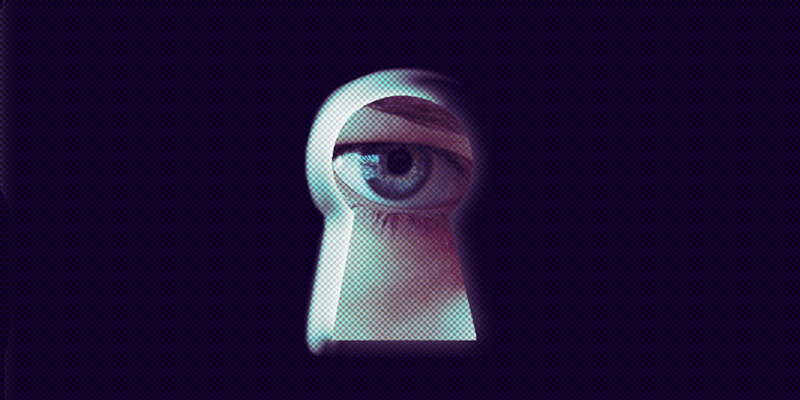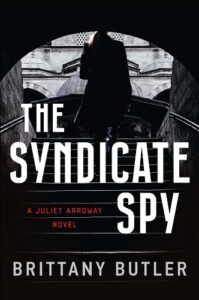When you work at the CIA, you’re taught that everything you do is a secret. You need to be invisible. But when I sit down to read a spy novel, it’s difficult to divorce my experiences from what I’m reading. I’ve had some courageous former CIA colleagues tackle both fiction and nonfiction and I’ve been impressed. But what I find fascinating is when authors manage to capture the true essence of espionage after having never worked in intelligence. Below is by no means a comprehensive list of spy thrillers and nonfiction works. It is a sampling of the spy books that I’ve picked up over the years and my thoughts on how they hold up against real spy work.
Fiction:
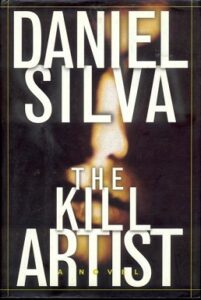
The Kill Artist by Daniel Silva
There is a reason why Silva is truly one of the greats. He nails the world of espionage on his first try, providing context and clarity to the complex Arab-Israeli war that is generations in the making. He provides a cast of highly entertaining characters to help you navigate this world (my favorite is Julian, the art dealer!). The only drawback is that he paints the woman in the stereotypical role that most men who write spy novels do—a sexual plaything who uses sex to get to the terrorist. While I enjoyed my first ride with Gabriel Allon, I’m excited to see how Silva’s female characters evolve in his books over the course of his series.
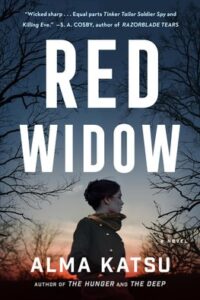
Red Widow by former CIA officer, Alma Katsu
Katsu delivers a first-rate novel using two intelligent female spies to deliver an accurate picture of the world of espionage. As a former CIA targeter, I appreciated her attention to the tricky case officer-asset relationship and the moral dilemmas that develop while running assets. The fact that the book is set in Russia’s division is an added bonus, especially with the Russia-Ukrainian war unfolding. Readers will get an insider look into what’s happening behind the scenes at the CIA with one of America’s longtime foes.
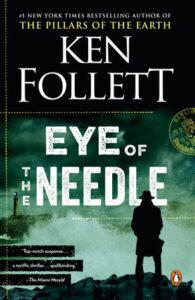
Eye of the Needle by Ken Follett
They don’t call Follet the true master of storytelling for nothing. I found myself completely immersed in this spy tale as Lucy (the housewife), Faber (the German spy), and Bloggs (a professor turned MI5 agent) navigate the end of WWII. Originally published in 1978, I cannot think of a more relevant or poignant spy novel that has been written since. I finished this book in one week because I could NOT put it down and found myself mourning for the characters and wanting to be drawn back into their tale even after I finished the last page. The best part of this novel is that the heroine was a woman and a mother—a literary work that was truly before its time. Now I’m onto Follett’s latest spy thriller.
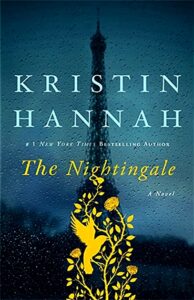
The Nightingale by Kristin Hannah
The Nightingale by Kristin Hannah tells the story of two sisters, Isabelle and Vianne in France during World War II and their struggle to survive and resist the German occupation of France. This is absolutely one of my favorite spy novels ever because it exposes female heroics in war. These two women were unbelievably brave and reading what they went through made my heart hurt, especially after knowing that women during this time got little to no credit for their wartime contributions. Men got the credit while women fought in the shadows, and it is still this way.
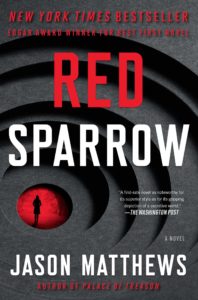
Red Sparrow by former CIA officer, Jason Matthews
One of the first things you learn when you attend the CIA’s training facility, the Farm, is how to conduct a Surveillance Detection Route (SDR). Matthews teaches you about this in the beginning chapters of his spy thriller set in Russia in the present day through his male protagonist, Nate, a CIA officer.
Although I was really surprised by how he portrayed the female intelligence officer. The Russian intel officer, Dominika is a sexual dominatrix who masturbates with her grandmother’s hairbrush and is trained as a seductress to pry men for intelligence—the way men have been portraying female intelligence officers for generations. To Matthews credit, Russians are rumored to use female intelligence officers like this so it’s not entirely outlandish. But honestly, I expected more from Matthews who knows better. I would have loved to see him portray a female intelligence officers for how they really are—women who employ the same tools, tradecraft and intellect as their male counterparts.
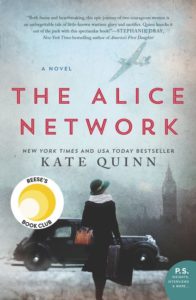
The Alice Network by Kate Quinn
This was a raw, intimate portrayal of women in espionage that can easily be compared with what it’s like to be a female spy today. The descriptions of World War II era espionage were extremely interesting and riveting. And then to learn that it was based on real female spies!! I love that Quinn shed light on female spies who fought for France’s liberation from the Nazis. I highly suggest this book if you are interested in female centric stories and female empowerment!
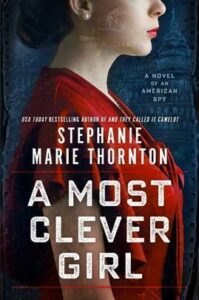
A Most Clever Girl by Stephanie Thorton
Thorton does a great job talking about the skills and attributes of a female spy. She nails how important it is to be able to read body language and gauge someone’s emotions and feelings while they talk something my former CIA boss brilliantly referred to as emotional intelligence. Thorton is smart in how she describes the careful dance between gaining trust and manipulation. But I didn’t love the way the female protagonist (Elizabeth) fell in love with her Russian handler (Levin) and readily agreed to spy on behalf of the Communists in the months leading up to WWII. I often was confused, wondering why Elizabeth would be willing to betray her country. I didn’t find her love interest (Levin, her Russian handler) a loveable character, so it was difficult for me to fight for Elizabeth and understand her choices. That being said, Thorton is a great novelist, and her writing alone will have you reading until the end to find out what happens to Elizabeth and whether she must face the consequences of her life choices.
Nonfiction
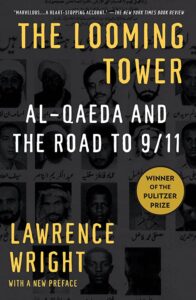
The Looming Tower by Lawrence Wright
This was required reading before I went to do targeting work in CTC’s Pakistan-Afghanistan department in 2011. It describes the birth of al-Qa’ida and terrorists Osama bin Laden and Ayman al-Zawahiri and how their movement led to the deadliest terrorist attacks on American soil. I would urge anyone looking to work at the CIA or other intelligence organization to pick up this book. It’s important to understand the events that led up to 9/11 so that history does not repeat itself.
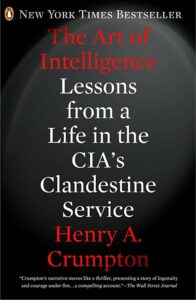
The Art of Intelligence by Henry Crumpton
Did you know that the CIA’s paramilitary officers were the first ones to land in Afghanistan after 9/11? In Crumpton’s book, you’ll learn about the vital role that the CIA played in leading the counterterrorism campaign against the Taliban and al-Qa’ida. I can think of no better book to read if you’re interested in learning how the CIA wages its wars today.
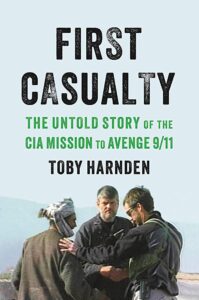
First Casualty by Toby Harnden
Mike Spann is one of the first eight CIA officers who was the first to land in Afghanistan after 9/11, was already a hero when I arrived in CTC’s Pakistan Afghanistan division in 2011. But Harden’s tale breathed new life into the conflict that I thought I knew everything about. His account of CIA’s war against al-Qa’ida and the Taliban is well-researched and credible. After the August 2021 withdraw of American troops after a very long war, I think it’s important to understand the stories of these brave Americans that gave up so much to avenge 9/11 to ensure that it never happens again.
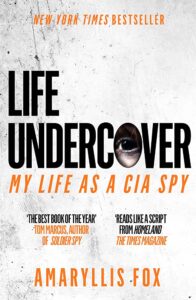
Life Undercover by Amaryllis Fox
You’ll never get a more accurate portrayal of what life is like in the CIA as a young woman. Fox pulls back the veil on how insane it is that at 20+something years old with little to no life experience, you’re charged with meeting terrorists and arms dealers, trying to uncover the details of the next 9/11 in some of the most dangerous places on earth. Fox is daring in her memoir about what her life was like at CIA, and honestly, I’m shocked that she was able to publish this! This is well-written and exposes some of the hard truths about the moral dilemmas that modern spies are faced with. This memoir is definitely worth your time if you’ve ever had a hunch that you wanted to get involved in spy work.
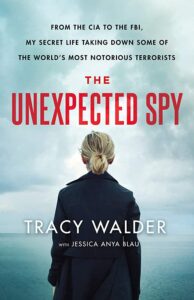
The Unexpected Spy by Tracey Walder
The Unexpected Spy by Tracey Walder is an unprecedented look at what it was like to work in one of the CIA’s most closely guarded programs. Walder is a true American hero who spent her weekends and holidays supporting counterterrorism efforts in the most dangerous parts of the Middle East. Her work was vital to our post-9/11 efforts to root out the Taliban and al-Qa’ida in Afghanistan.
She often spent her nights and weekends glued to a screen, watching footage of the men who trained and provided safe haven to the 9/11 hijackers. I respect this woman a great deal. She gives readers a glimpse into what spy-work is actually like and will inspire women everywhere who are interested in a career in the field. A must-read!
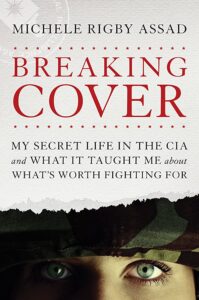
Breaking Cover by former CIA officer (and my former boss) Michelle Rigdby Assad
If you ever were or are interested in a career at CIA, this should be required reading. You need to know what you’re getting into, and Assad does not hold back. The CIA is looking for people who are walking contradictions. They want people who are honest but can lie. They want people who have never broken the law but are willing to do so in other countries. They are looking for people who are honest but can manipulate. If you have ever wondered what the life of a spy is really like, do yourself a favor and pick up this book. You won’t be disappointed.
***

